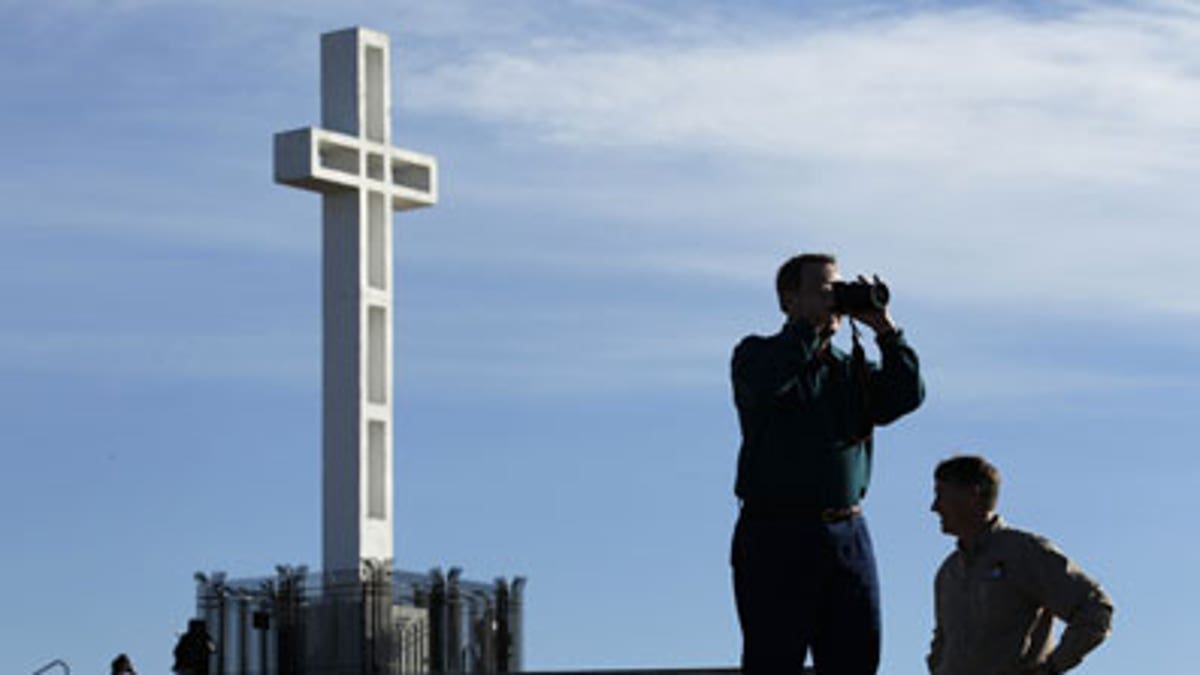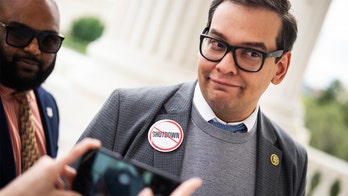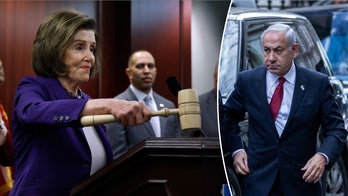
In this Jan. 4, 2011 file photo, Rev. John Fredericksen of Orlando, Fla., alongside Burdette Streeter, of San Diego, takes a picture in front of the war memorial cross on Mount Soledad in San Diego. (AP)
SAN DIEGO – Supporters of a war memorial cross deemed unconstitutional last year by a federal court plan to ask the Supreme Court to reverse the decision, amid a growing fight nationwide over the use of religious symbols to honor fallen troops.
A nonprofit legal firm, Liberty Institute in Washington D.C., planned to file its petition Thursday to preserve the 43-foot cross on federal land atop San Diego's Mt. Soledad -- the same day the group called on combat veterans and supporters to demonstrate at the picturesque site overlooking the Pacific Ocean in the suburb of La Jolla.
The Supreme Court has signaled a greater willingness to allow religious symbols on public land, and the U.S. House of Representatives passed a bill last month that writes into law the propriety of displaying such markers at war memorials.
Last year's ruling by the 9th Circuit U.S. Court of Appeals capped two decades of legal challenges over the 1913 monument, which became a memorial to Korean War veterans.
A number of other military memorials on public lands across the country have been challenged in recent years by civil liberty activists and atheists who say they violate the separation between church and state. The Supreme Court in 2010 refused to order the removal of a congressionally endorsed war memorial cross from its longtime home atop a remote rocky outcropping in California's Mojave Desert.
But Rep. Duncan Hunter, R-San Diego, said he is not relying on the courts. He introduced the bill passed by the House in January that would codify the existing practice of allowing religious symbols at military monuments established or acquired by the federal government.
Hunter said he drafted the bill with the Mt. Soledad monument in mind but it goes beyond that.
"This isn't just about San Diego," Hunter told The Associated Press. "This about the rights of members of the military to adorn gravestones and war memorials to honor those who fought in wars with whatever the heck they want to have there, period. If you want to take down a war memorial cross or take any kind of religious symbolism off any war memorial because you say it's unconstitutional, then you would have to take the crosses off every headstone in national cemeteries from Arlington to Fort Rosecrans."
Hunter said opponents have been getting out of hand, challenging even personal memorials, like a pair of unsanctioned crosses on a remote rocky hilltop on the Marine Corps base of Camp Pendleton put up by individual Marines to honor fellow fallen troops.
The crosses are surrounded by thousands of rocks carried up by Marines, some of which are accompanied by handwritten messages. Opponents complained about the crosses, which cannot be seen by the public, after The Los Angeles Times wrote a story about them on Veteran's Day 2011.
"It's getting old, getting burdensome and costly," Hunter said. "It's time to put an end to it."
Members of the American Civil Liberties Union that won the lawsuit in the 9th Circuit said the bill ignores the Constitution, which they argued was written to ensure government monuments do not exclude people based on their beliefs.
"Congress cannot, by definition, authorize the government to violate the Constitution," said David Loy, the ACLU's legal director in San Diego. "It's unconstitutional for the government to sponsor and maintain this particular cross that is visible for miles. The point of a war memorial or veterans' memorial is to remember all veterans."




